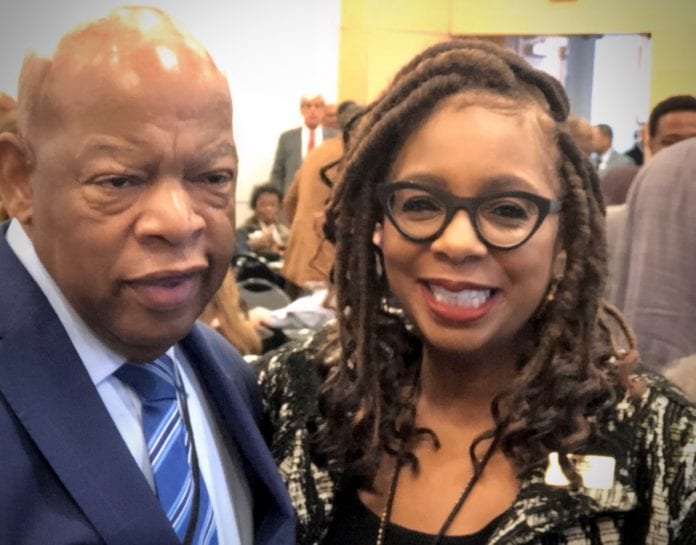The nation and the world met a young, hopeful John Lewis on March 7, 1965 when he helped lead marchers across Selma, Alabama’s Edmund Pettus Bridge on what became known as “Bloody Sunday.”
Lewis death last Friday (July 17) re-ignited a month-and-a-half-long effort to memorialize his legacy by renaming the Edmund Pettus Bridge in his honor. A petition to do just that now boasts well over half a million signatures.
“We should push mightily for this renaming,” said Faith Morris, chief communications officer at the National Civil Rights Museum. “Let’s be as serious, determined and focused in doing this for John Lewis as he was in fighting for us. I just wish he had lived to see this happen. I know he would be proud.”
Michael Starr Hopkins, a Washington, D.C. attorney and activist, started the petition at the end of May after protesting George Floyd’s murder, coming home from the protest march and watching “Selma” again.
Hopkins gave life to “The John Lewis Bridge” after researching the name of Edmund Pettus, who was a Confederate Army officer and a grand dragon of the Ku Klux Klan. He urged others to sign the petition, declaring, “We can’t miss this moment.”
Morris recalls the distinct honor of meeting Lewis at a soiree in the nation’s capital.
“Congressman Lewis danced the night away, light-footed and fancy free,” Morris said. “This was not the John Lewis I expected because what I had seen of him before then was a very serious, very determined, very focused man. This John Lewis just wanted to enjoy the evening, and he did. I even got in a dance and a laugh with him. I loved the contrast.”
Lewis was aware that the petition had been started at the time of his death. When the announcement was made that he had lost his fight with pancreatic cancer, hundreds of thousands rushed to sign the petition.
The Change.org document is the largest petition ever started on Change.org.
Morris recalls a very great debt of gratitude owed by the National Civil Rights Museum to Lewis
“Congressman Lewis did something very special for us,” Morris said. “He brought his Congressional Pilgrimage with a delegation of 35 representatives from all over the country to the Museum in March of 2018. He said it was important for Congress to understand the trials and tribulations of the Movement. That they needed to understand what the Movement was about, and why it was still going on.
“We were all deeply moved. I got to talk to him over lunch, thank him for that special moment, and get another promise that he would return April 4, 2018, for MLK50. He promised, and he did return.”
The renaming is not without its controversy, however, Morris acknowledged. Some have argued that the renaming would be a disservice to the other protesters who marched and endured violent beatings that day. Lynda Lowery, who was 14 at the time, and received 35 stitches to her head that day, is among those who have voiced opposition to the renaming.
Hopkins, the petition’s author, said of the opposition, “If we get so busy arguing, I’m not sure we will have this chance again.”
This year, when Lewis made the now symbolic march across the Pettus Bridge, he said: “On this bridge, some of us gave a little blood to help redeem the soul of America. Our country is a better country. We are a better people, but we have still have a distance to go before we get there.”
Morris said every American, no matter what race or creed, should support the move to rename the Pettus Bridge in honor of Lewis.
“Every time I walk across the symbolic Edmund Pettis Bridge in the “Selma” exhibit at the Museum, I think about John Lewis,” Morris said.
“It is here that we tell the story of ‘Bloody Sunday.’ It’s important that this bridge be named for Lewis, an American hero who risked his life and that of the 600 others who made the long, dangerous walk for voting rights. It should not remain named for Pettus, a Confederate general and KKK leader, who I don’t consider worthy of such an honor.”
Elwin Wilson, who confessed to beating Lewis, came to him and apologized, asking forgiveness for his racist acts against numerous African Americans in Selma. Wilson went to each one in Selma who was still living. Wilson said he had an awakening after President Obama was elected to office.
He asked Lewis to forgive him.
Lewis did, and they embraced.



